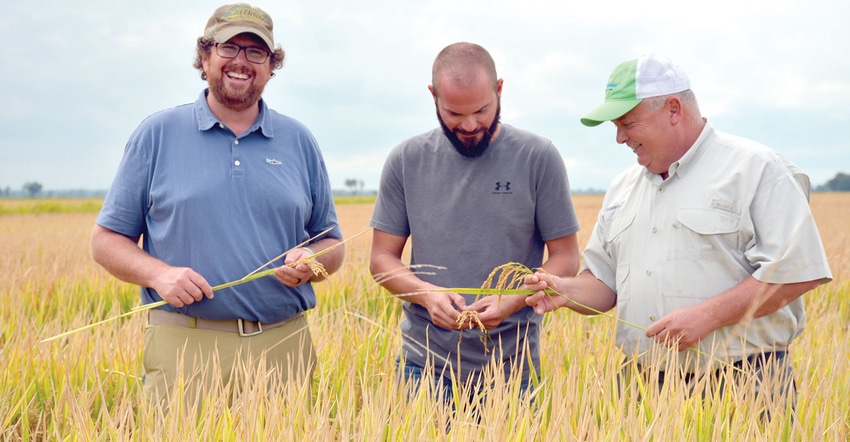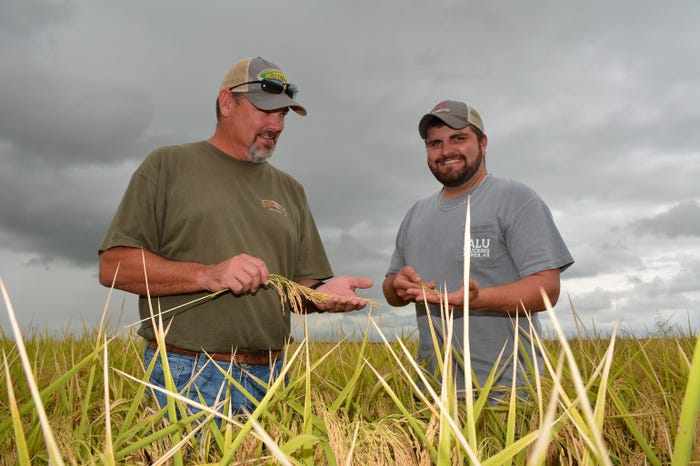
Three Arkansas rice farmers and their crop consultant agree that the new dicamba technology should have reasonable application timing limits, but also that farmers need the herbicides to control pigweed in cotton and soybeans.
“We need to plant Xtend soybeans and use dicamba,” says Poinsett County, Arkansas, rice and soybean farmer Jonathan Ashlock. “We need to be able to use dicamba. We didn’t use any at all this year.” The cutoff date, April 15, was too early to use the product effectively.
“We need the technology, but with a realistic cutoff.”
He says other herbicides are available but some of the most effective “are hard on soybeans. Some varieties are more tolerant than others, so we have to know the variety.”
He also believes his best varieties, the ones he can count on for best yields, are the ones with the dicamba tolerant traits.
“If we don’t have dicamba next year, I’ll plant LibertyLink soybeans. But I prefer the new technology varieties.”
He used dicamba last year. “I sprayed every acre myself and had no trouble at all. Education meetings helped, and we also had more farmers planting Xtend crops, some to protect themselves. But that’s not the best way to farm.”

Rice and soybean farmer Jonathan Ashlock and son Logan Mitchusson check rice prospects in Poinsett County, Ark.
Cultural Practices
He rotates acreage every year, pulls pigweed by hand and uses a pump-up sprayer to kill any escapes he sees.
“We do all that and we still have pigweed. We have some resistance,” he adds.
“We need every tool we can get,” says Jessie Flye, who farms with his brother, Logan White, just over the ridge from Ashlock. “Maybe a May 15 to June 1 cutoff date would work.”
He says he and Logan are careful with any spray application. “We will not spray anything if it could hurt another man’s crop. That’s the biggest issue.”
He says they can keep cotton pretty clean with Liberty and Roundup, with some additional chopping. But it’s expensive. “We had a $200,000 chopping bill just to keep the cotton clean,” Flye says.
White adds that the varieties with the dicamba technology also produce their most consistent yields.
He and Flye say rotation and cover crops help with weed control. They grow rice, soybeans, cotton and corn.
“We need dicamba,” says Eddie Cates, who is the crop consultant for both farms. “They can use Liberty, but they need this technology. Those varieties are very good.”
He says not all his clients agree. “Some feel differently about dicamba,” he says. “I’m kinda caught in the middle.”
He agrees that a May 30 cutoff date could be a good compromise.
Larry Steckel, University of Tennessee weed scientist, at an early September cotton field day in Jackson, Tenn., said complaint reports on dicamba drift for Tennessee are about half what they were a year ago.
He says a reasonable cutoff date likely will be part of any new registration from EPA. He says he expects the products to be registered.
Cates, an independent crop consultant who has logged more than 30 years of scouting and consulting and serves as president of the Arkansas Crop Consultant’s Association, says farmers need the technology. “I would like to emphasize the importance of keeping this technology,” he says. “The ability to control pigweed and the variety selections are what the standards should be compared to. We need dicamba.”
About the Author(s)
You May Also Like






